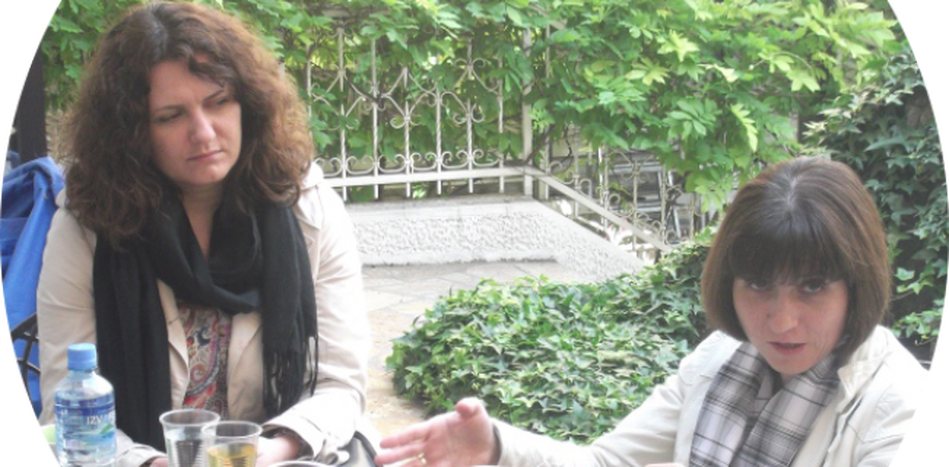
Life with Disability: “I am not Feeble-minded, I just Can’t Hear You Well”
Published on
When I go to the counter in some institution, I have to read the lips of the officer behind the counter because I cannot hear the voice. Sometimes I do not understand so I have to ask same things several times. Then this person becomes upset and starts yelling at me saying word by word, as if I am feeble-minded
Article by: Jelena Đorić, Hrvoje Nimac, Haris Dedović Edited by: Ana Alibegova & Stefan Alijevikj
“When I go to the counter in some institution, I have to read the lips of the officer behind the counter because I cannot hear the voice through the glass. Sometimes I do not understand so I have to ask same things several times. Then this person becomes upset and starts yelling at me saying word by word, as if I am feeble-minded. Then I have to tell them: Sorry, I’m not stupid, I just can’t hear very well”. This is how Sandra Peshevska-Mickovska, a passionate painter and a member of the Association of Students and Youth with Disabilities portrays an unusual situation from the everyday life of a person with disability in Macedonia. Together with Daniela Stojanovska – Djingovska, the President of the Association of Students and Youth with Dissabilities, they present their organizational activities, explain the challenges they are facing, discuss the inclusion of the disabled people in Macedonia, and send a message that being disabled does not require a special treatment or over-emotionalizing, but equal rights as any other citizen of the country.
M!: Tell us something about your association. What are the activities you work on?
Daniela: Our association started working in 2002 and at the beginning was registered as an “association of students”, however, some time later, we re-registered and became “youth association”, being able to also include other young people with physical difficulties. The association has around 150 members and while most of them are people with disabilities, we also have 10-20 per cent of people without disabilities as we are an inclusive organization.
Regarding activities, first, there is the promotion and implementation of inclusion of people with disabilities, but in addition, we are working on the realization of rights, equality and on the correction of system errors that we have in Macedonia. Essentially, we are trying to remove all barriers for people with disabilities, in order to engage them more easily in the educational processes.
M!: Do you cooperate with the authorities in Macedonia?
Daniela: When it comes to financing, as an association we are not getting anything from the present government and we have not gotten anything from any of the preceding governments either. We are funded strictly by foreign donations. Since we operate as a service and we are unique in this regard, we have tried in the past to get some funding from the authorities, but it was all in vain. One thing I can commend is that we have a good cooperation with the governments regarding creation of new laws. In 2008 an Act was adopted that enabled people with disabilities to be free of fee payment for enrolling to higher educational institutions. This resulted with increased number of people with disabilities going to college. And on a local level, in the city of Skopje, the transportation for the people with movement difficulties has been solved.
M!: What is the infrastructural capability of space for people who have movement difficulties?
Daniela: There is almost no improvement. To make the things worse, there is legal regulation on the accessibility of built space, but it is not implemented. Even the newly constructed buildings and institutions do not have any improvements. However, some of the educational institutions solved this issue, such as the Faculty of Philosophy in Skopje where most of the people with disabilities are obtaining their studies. Nonetheless, there are still a lot of faculties that do not have provided an access for people with disabilities. An irony is that, for instance, the Faculty of Architecture and Faculty of Construction Engineering are some of them as well. So people with disabilities enroll to colleges only with good access. It is an obstacle for you to enroll a faculty when you do not know how you will manage to enter in the faculty building. An example in this regard is that people with hearing impairments usually enroll in painting or sculpture colleges.
M!: This was about people with mobility problems. What about people with visual impairments?
Daniela: This problem is solved very badly. People with visual impairments usually go to the Faculty of Law in Skopje. Adapted literature is non-existent and there are no professional books in Braille. Most of the students with visual impairment use the JAWS screen reader. Before the JAWS screen reader came into use, the students with visual impairments had their books read by their colleagues and all the material was recorded on tapes so that they can use it.



